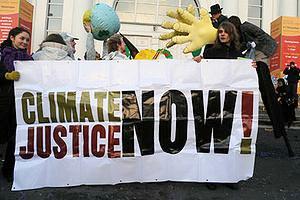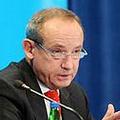 帶著寫著「世界銀行別插手氣候變遷」和「現在給我氣候正義」的布條,環保團體12月9日在聯合國氣候會議的入口示威,希望讓世界銀行停止對氣候變遷的財務干預。
帶著寫著「世界銀行別插手氣候變遷」和「現在給我氣候正義」的布條,環保團體12月9日在聯合國氣候會議的入口示威,希望讓世界銀行停止對氣候變遷的財務干預。
12月9日一共有142個非政府組織發表了一個聯合聲明拒絕世界銀行所扮演的角色。
美國地球之友的國際財務募款員奧倫斯汀(Karen Orenstein)表示:「世界銀行在解決氣候變遷危機上,不是個可信任的機構。它的氣候投資基金有不可挽救的謬誤,應該要立即停止其運作。」
「發展中國家亟需要數十億的援助,以應對因為氣候變遷而造成越來越頻繁的暴風、乾旱、飢荒和水災,同時也需要這筆資金建立低碳經濟。但是這些基金卻必須由聯合國氣候大會所控制的財務機制才能動用。」奧倫斯汀表示。
調適基金於2007年12月的巴里島會談成立,理論上這個由工業國家提供的數十億基金應該用來幫助開發最少的國家,用以應對氣候變遷可能帶來的災害和建立低碳經濟。
這些國家希望可以直接由這筆基金得到援助,而不需要經由世界銀行的同意。目前,世界銀行總裁是由前美國貿易代表佐利克(Robert Zoellick)擔任。
儘管某些工業國家對於直接援助不是很放心,聯合國氣候變化綱要公約UNFCCC的執行秘書德布爾(Yvo de Boer)於12月9日表示:「我們同意這筆基金可以透過鑑定合格的國內機構提供直接援助。」
但是有些最低度發展國家缺乏「鑑定合格的國內機構」,而關於是否政府可以直接取得這筆資金引發了持續地辯論,德布爾表示這個爭議將會於12月11日和12月12日由部長們參加的高規格氣候會談來決定。
非營利組織對世界銀行的批評部分是因為他們認為,最低度發展國家要解決由工業經濟體所造成的全球暖化,應該得到的是補助金而不是貸款。
「世界銀行的氣候基金強迫開發中的國家為工業國家的污染買單,還提供貸款給這些國家來解決不是他們所造成的氣候問題。」非政府組織在這份聯合聲明中表示。
他們說:「這項措施違反了聯合國氣候變遷公約的責任,工業國家應該有責任對解決和適應提供財務援助。」 「世界銀行在解決氣候變遷上有嚴重的利益衝突問題,身為一個破壞氣候和砍伐森林的組織,世界銀行沒有任何立場來解決氣候變遷的危機。世界銀行在2007-2008其間增加了對石化燃料的貸款高達94%,單單對煤碳的貸款就增加了256%,世界銀行甚至以抵抗全球暖化之名貸款給煤碳產業。」
2008年10月,世界銀行集團發表了一個解決氣候變遷需求的策略架構,承諾要:
- 支持各國家帶領下的氣候行動發展過程
- 流通額外的受益和創新的資金流動
- 幫助市場導向的融資機制發展
- 運用私部門的資源
- 支持新科技的加速發展與運用
- 加快政策研究、知識和能力的訓練
世界銀行集團表示他們會增加對能源效能和新再生能源的融資每年達30%的成長,從現有的美金6億元,將由增加水力發電的貸款、增加低碳計畫融資由2006年-2008年的40%到2010年的50%。然而,最低度發展國家到底需不需要償還這筆錢,世界銀行並沒有任何具體表示。
Bearing banners with the message "World Bank Out Of Climate,"and "Climate Justice Now" environmentalists protested outside the main entrance to the UN climate conference on Tuesday in an attempt to keep the bank from controlling climate change finance.
Today, 142 nongovernmental organizations issued a joint statement rejecting any such role for the World Bank.
International Finance Campaigner Karen Orenstein with Friends of the Earth US said, "The World Bank is not a credible institution to play any role in addressing the climate crisis. Its Climate Investment Funds are irreparably flawed and should be shut down."
"Developing countries urgently need billions of dollars - to cope with the increase of storms, droughts, famines and floods that they face due to climate change, and to build low carbon economies. But these funds must come through financial mechanisms controlled by the UN climate convention, in which all parties have equal say," declared Orenstein.
The Adaptation Fund was approved at the Bali talks last December. Theoretically, the multi-billion dollar fund provided by industrialized countries is supposed to help least developed countries cope with the potentially disastrous effects of climate change and build low carbon economies.
The least developed countries want "direct access" to this money without having to go through the World Bank, headed by former U.S. Trade Representative Robert Zoellick.
Although some industrialized countries are not comfortable with allowing such direct access, UNFCCC Executive Secretary Yvo de Boer said Tuesday, "We have agreed on direct access to the fund through accredited national agencies."
Yet some least developed countries have no "accredited national agencies," and the debate about whether their governments will be able to access these funds directly is ongoing. De Boer said the issue may be left up to the ministers to decide when they arrive for the high-level part of the climate talks on Thursday and Friday.
The NGOs are critical of the World Bank in part because they say least developed countries deserve grants, not loans, to adapt to global warming caused by the greenhouse gas emissions of the industrialized economies.
"World Bank climate funds force developing countries to pay for the industrialized world旧 pollution by providing loans for them to adapt to a climate crisis they did not create," the NGOs said in their joint statement.
"This contravenes the UN climate change convention obligation that industrialized countries are obligated to provide finance for mitigation and adaptation, and compete with UN schemes for money," they said.
"The World Bank has serious conflicts of interest with tackling climate change," the NGOs state. "As a major climate polluter and a major deforester, the World Bank is in no position to address the climate crisis that it is helping to cause. The Bank increased its lending for fossil fuels by 94 percent between 2007 and 2008; coal lending alone increased 256 percent. It is even financing coal in the name of fighting global warming."
In October, the World Bank Group released a Strategic Framework for dealing with the demands of climate change. The bank said it would:
- Support climate actions in country-led development processes
- Mobilize additional concessional and innovative finance
- Facilitate the development of market-based financing mechanisms
- Leverage private sector resources
- Support accelerated development and deployment of new technologies
- Step up policy research, knowledge, and capacity building
The World Bank Group said it will increase financing for energy efficiency and new renewable energy by an average 30 percent a year, from a baseline of US$600 million, and expand lending to hydropower, with the share of low-carbon projects rising from 40 percent in fiscal years 2006�08 to 50 percent in fiscal year 2011.
But nowhere did the bank say that least developed countries would not have to pay back money they receive to adapt to climate change.


